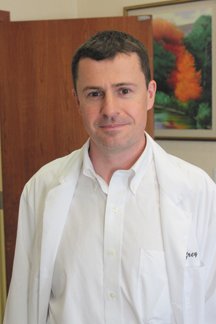People more than 100 pounds overweight face some hard choices, especially when they have unsuccessfully tried traditional ways of weight reduction. They often face serious medical risks if they do not reduce, yet get frustrated by the fact that they have tried all the traditional ways and have failed.
Bayonne Medical Center’s Bariatric Department is trying to help these and other people who might be confused about the options they have, especially when it comes to surgery.
The options
While exercise and eating right are considered the best means of weight reduction, often people who are in excess of 100 pounds start considering surgery, as they risk contracting diabetes or worse, heart disease and other problems.
“We talk about some of the problem with obesity, and talk about what can be done to combat it.” — Dr. Jeff Strain.
________
“There are basically three types [of surgery],” he said. These include banding, gastric bypass, and a modified bypass, which uses a small tube and avoids inserting anything artificial into the body.
“The advantage of this is that it can be done in the same day,” he said.
Each method has different advantages. Some methods obtain rapid weight loss, while others are less intrusive. The purpose of the sessions is to make people aware of their options.
“Weight loss surgery can help people with diabetes, hypertension, high cholesterol, sleep arrhythmia,” he said.
Affects many
Obesity is a disease that affects 34 percent of adults age 20 and over in the United States, which amounts to more than 72 million people. About 33.3 percent of American men and about 35.3 percent of American women are technically obese.
The number of overweight and obese Americans has increased almost continuously since 1960. About 66 percent of U.S. adults were estimated to be either overweight or obese by the 2003-2004 National Health and Nutrition Examination Survey.
The rate of obesity differs from state to state, which is probably a reflection of various lifestyle, age, and economic factors.
If you are obese, you may have inherited it, because it has a strong genetic component. Your environment is another contributor. Culture also contributes, since physical activity is often not required for work these days, and the foods that cost the least often contain the most calories and the fewest nutrients.
High blood pressure, diabetes, heart disease, stroke, gallbladder disease, cataracts, age-related macular degeneration (AMD), and cancer of the breast, prostate, and colon are all associated with obesity, and obesity creates complications when people are suffering from a number of other disorders.
The seminars, held the first Thursday of every month, are designed to let people know what to expect. The next session will be on June 3 at 6 p.m. These are free and open to the public.
“We talk about some of the problems with obesity, and talk about what can be done to combat it, and then we field questions about people’s options,” Strain said.
The term obesity generally means 100 pounds above a person’s recommended weight.
“We encourage diet and exercise, and we work in conjunction with a dietitian, physician and consult the cardiologist,” he said. “This is a life-saving procedure. It is the only cure for Type 2 diabetes.”
Prior to surgery, the doctors look at a person’s health in an effort to make conditions optimal for surgery. They check the condition of the heart, blood pressure, and blood sugar levels.
After surgery, followup is critical to success, he said.
“This is a lifelong process,” he said.
Accompanying the surgery must be some life changes. “What is common in all cases is that people are struggling in their relationship with food,” Strain said.
